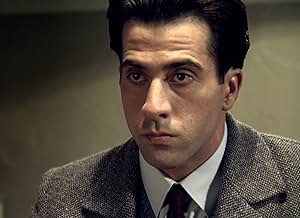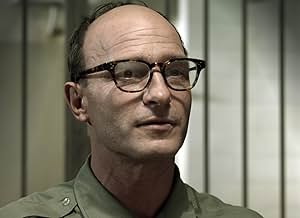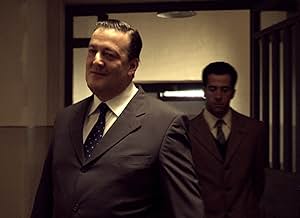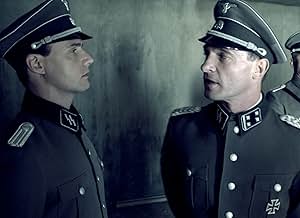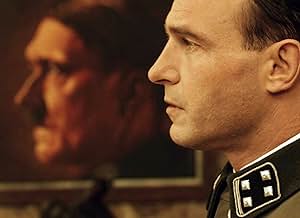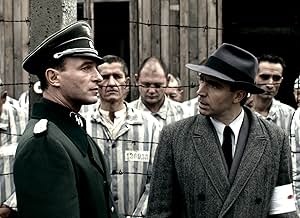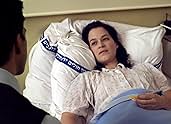Agrega una trama en tu idiomaBased upon the final confession of Adolf Eichmann, made before his execution in Israel as he accounts to Captain Avner Less, a young Israeli police officer, of his past as the architect of H... Leer todoBased upon the final confession of Adolf Eichmann, made before his execution in Israel as he accounts to Captain Avner Less, a young Israeli police officer, of his past as the architect of Hitler's plan for the Final Solution. Captured by intelligence operatives in Argentina, 15 ... Leer todoBased upon the final confession of Adolf Eichmann, made before his execution in Israel as he accounts to Captain Avner Less, a young Israeli police officer, of his past as the architect of Hitler's plan for the Final Solution. Captured by intelligence operatives in Argentina, 15 years after World War II, Eichmann (Kretschmann), the world's most wanted man, must be bro... Leer todo
- Dirección
- Guionista
- Elenco
- Self
- (material de archivo)
- (voz)
- Baroness Ingrid von Ihama
- (as Tereza Srbová)
- Hannah
- (as Tilly Golding)
- Dirección
- Guionista
- Todo el elenco y el equipo
- Producción, taquilla y más en IMDbPro
Opiniones destacadas
All of that is leading up to my strong suggestion that you skip the film and read Hannah Arendt's amazing book about the actual Eichmann trial in Jerusalem, Eichmann: A Report on the Banality of Evil. Here you will find a non-dramatic, non-titillating version of the story that neither exaggerates nor diminishes Eichmann's evil, but rather reveals him in a matter-of-fact way as an opportunist, a careerist who merely wanted to advance, climb the ladder, attain the next "title," etc. He apparently did not have any particular hatred toward Jews. None of this in my estimation makes him less evil; the book actually reveals the "banality" of his evil by taking away the specter of a crazed monster. His evil lies in its being sane and in a sense "ordinary." Therefore, given its serious subject matter, I feel the film only partially reflects the facts Arendt reveals so clearly, obscuring them with with sex and useless side stories. The performances are good, the film is well made, etc. That's not my point. If you want to make a formulaic film, a horror film, a sexy film, or any other kind of film, have at it. But don't use Eichmann as your subject matter. The subject matter is too serious to be misused in any way. Read the book, please.
The film opens after the 1960 capture of Eichmann from his home in Argentina, the country where he and his wife and four sons had been in hiding since the end of WW II. Adolf Eichmann (brilliantly portrayed by Thomas Kretschmann) had been the World's Most Wanted Man and his transport to Israel was met by jeering crowds. The Israeli Minister Tormer (Stephen Fry) elects police captain Avner Less (Troy Garity) to conduct the interview in what is supposed to be a top-secret assignment. But the news escapes and Avner's wife Vera (Franka Potente), suffering from polio of the spine, and the Avner children are marked as targets by the Israeli's who do not appreciate the duty of Avner Less's obligation to interrogate and gain a complete confession from Eichmann before he can be tried. The months that the interrogations take prove that the Israeli's believed in justice: the facts must be proved completely before the prisoner is tried for atrocities.
During the interrogation months Eichmann is shown in flashbacks to have been not only following the orders of Hitler, but being committed to the purification of the 'Aryan race'. What screenwriter Snoo Wilson and director Robert Young allow is for us to see the human weakness of Eichmann as portrayed By Kretschmann: he had mistresses, including one Austrian Jewess and a Hungarian Countess who urged him to complete the Final Solution, he coldly signed extermination orders 'because he had to follow Hitler's orders', yet he also was an apparently devoted father to his own sons. Equal time is given to allow the audience to see the interaction between the conflicted parties of the interrogation: Avner was convinced he must prove beyond a shadow of a doubt that the prisoner was indeed guilty of all of the crimes fro which he was accused. The interrogations become a battle of wills between the smarmy, oily, manipulative Eichmann and the personally distraught Avner. At the close of the film the real Avner E. Less provides voice over regarding the hanging of Eichmann along with statistics of the Nazi atrocities that no matter how often they are quoted continue to astonish our ability to comprehend.
The only artistic aspect of the film that is ultimately distracting is the director's choice to have cinematographer Michael Conner use near black and white/sepia toning for the film. Certain scenes break into real color but the tone of the film footage seems dirty - and perhaps that is the reason for the choice. Richard Harvey adds the musical score, and there are some very fine cameo roles by Delaine Yates, Tereza Srbova, and Judit Viktor. But in the end it is the performance by Thomas Kretschmann that is terrifyingly real: he deserves awards for his courage to accept this role and for his unforgettable impersonation of a man so evil that under other actor's skills would be simply unbelievable. It is Kretschmann's extraordinary performance that brings home the terror of his film.
Grady Harp
This is a historic drama with biographic elements dealing with Adolf Eichman and his interrogator officer Avner Less well performed by Thomas Kretschmann and Troy Garity, respectively. Furthermore, Stephen Fry as Jewish Minister and Franka Potente as affecting Avner's wife. The story is carried out by means of various flashbacks describing the cruel existence of Eichmannn. Atmospheric musical score by Richard Harvey and cold cinematography by Mike Connor. The motion picture is professionally by Robert Young.
Adding more remarks along with the widely narrated on the movie referred to Adolf Eichmann, his life is the following : Eichmann (1906-62) was born in Austria. After starting as a lowly file clerk , he learned that there was an opening in Heinrich Himmler's SD, the information center for the Gestapo . Himmler, who believed that Eichmann could speak Hebrew, made him head of the Scientific Museum Jewish Affairs. In 1937 Eichmann paid a short visit to Palestine to get in touch with Arab leaders , but the was ordered out of the country by the British. On his return to Germany he was rapidly promoted. After service in the Reich Central Office of Jewish Emigration he was made chief of Subsection IV-B-4 of the RSHA, the Reich Central Security Office, as an expert on Jewish affairs. He was present at the Wansee Conference on January 20 , 1942, when it was decided to deport Jews to the extermination camps. In August 1944 Eichmann reported to Himmler that, although the death camps kept no exact statistics , 4 million Jews had died in them and that 2 million more had been shot or killed by mobile units. Arrested at the end of WWII, Eichmann escaped unrecognized from an internment camp in the American zone in 1946 and disappeared. On May 11, 1969, the Israeli secret service found him in Argentina and smuggling him back to Israel . His trial , which took place in Jerusalem from April 11 to August 14, 1961, aroused worldwide attention. He was charged with crimes against humanity, and war crimes. Found guilty, he was hanged at Ramle on May 31,1962.
Thomas Kretschmann's work here is superb, truly superb, particularly in light of the fact that the film interrupts this superb acting with cutaways to various scenes while the voice of Kretschmann as Eichmann is heard writing letters to his children. I don't CARE. Give me more of Kretschmann being interrogated. He is riveting.
Now, the bad stuff:
The 'artistic license' this film takes is shameful in that it is an insult to every single jew who was murdered by the Nazi regime. There is no good reason for the filmmakers to have given Eichmann a Viennese Jew for a mistress. The notes of Eichmann's interrogator, Avner Less, do not mention anything about this, nor did it come up in Eichmann's Nuremberg trial-in-absentia or the Israeli trial. Nor was there a need to make Eichmann the lover of a Hungarian mistress who was so insatiable for the deaths of jews that she would reprimand him for not killing enough while they engaged in foreplay. This is obscene and it obscures the larger truth that seemingly inconsequential, everyday men can do terrible damage.
To take these liberties is an attempt to obscure the monster that Eichmann really was. To remove the inexplicable terror that is the result of banal men doing unspeakable things in the name of ideology and / or the protection of a larger group of criminals, is misguided at best and an insult to every Jewish man, woman and child who walked into those building thinking they were going to get a shower.
They should have stuck to the text of "The Eichmann Interrogation" and let the actors use their skills to produce the tension. That's what they are paid for, after all, and I would have liked to have seen more of the interaction between the two main characters.
I give it a '4' on the strength of Thomas Kretschmann's acting alone. Otherwise this movie is a terrible waste of time.
¿Sabías que…?
- TriviaAccording to a British reporter on location, fellow cast members Troy Garity and Thomas Kretschmann were so upset with script revisions of the baby-in-office scene that Kretschmann promptly threw them in the trash, explaining, 'I'll just file this here for safekeeping.' The revisions were later dropped.
- Errores(at around 1 min) In the scene where the minister leaves the room after telling Avner that his father had been sent to Auschwitz by Eichmann, a large contemporary map of Europe is visible on the wall. The maps contains the re-unified Germany, the successor states of the Soviet Union, the broken up former Yugoslavia, and the split Czech and Slovak Republics - which is the late 1990s status and not 1960/61.
- Citas
Avner Less: [after Eichmann's interrogation and trial] We showed him more justice than he ever showed us.
- Bandas sonorasAlma Partida
Words and Music by Mauricio Vanegas
West One Music Ltd
Selecciones populares
- How long is Eichmann?Con tecnología de Alexa
Detalles
- Fecha de lanzamiento
- Países de origen
- Sitio oficial
- Idiomas
- También se conoce como
- Adolf Eichmann
- Locaciones de filmación
- Productoras
- Ver más créditos de la compañía en IMDbPro
Taquilla
- Presupuesto
- USD 8,000,000 (estimado)
- Total en EE. UU. y Canadá
- USD 2,706
- Fin de semana de estreno en EE. UU. y Canadá
- USD 573
- 31 oct 2010
- Total a nivel mundial
- USD 2,706
- Tiempo de ejecución1 hora 36 minutos
- Color
- Mezcla de sonido
- Relación de aspecto
- 1.85 : 1
Contribuir a esta página



